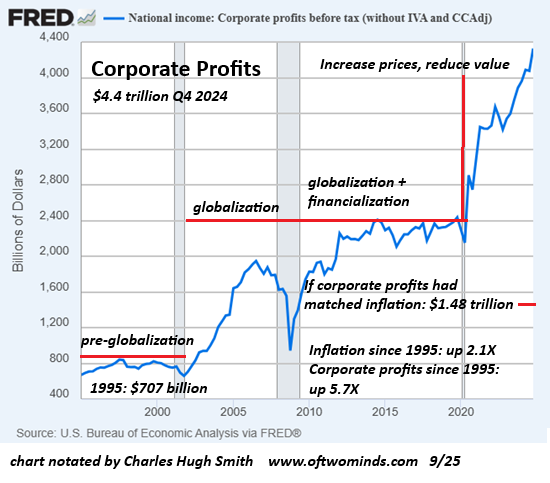Price Doesn't Reflect Value, And We're Paying A Steep Price For Confusing The Two

Image Source: Pexels
Price and Value--now there's a twisted tale. We've been trained to compare price and buy the lower priced option as the better value, but price doesn't reflect value, and we're paying a very steep price as individuals and as a nation for confusing the two.
In economic theory, price is a signal, a flow of information between the producer, seller and buyer. Like all economic theory, this sounds nice, but what's left out of this information flow is the value of the product or service, which is opaque / unknowable to the buyer.
Price can be low, but value can be lower--or even negative. Consider the aggregate / lifetime "value" of a diet of junk food, fast food, sugary beverages and ultra-processed snacks and foods. The price was presented as "a good value," but what's the "value" of a diet that generates chronic diseases that degrade our lives and cost a fortune to treat?
The "value" of a diet of junk food, fast food, sugary beverages and ultra-processed slop is extremely negative, for the aggregate health consequences are extremely negative and the eventual price of treating the chronic diseases is extremely high.
Every single-use plastic product was a "good value," and now there's micro-plastics everywhere, including our bodies. The full consequences have yet to be tallied, but it's already clear that the "value" of single-use plastic products is extremely negative.
Microplastics Could Be Weakening Your Bones, Research Suggests: The review of more than 60 scientific articles showed that microplastics, among other effects, can stimulate the formation of osteoclasts, cells specialized in degrading bone tissue. (WIRED.com)
What is the "value" of an appliance that breaks down in a few years compared to the "value" of an appliance that lasts for decades? I've often noted the collapse of durability in appliances and other products that has tracked globalization and corporations' exploitation of the fact the value of their products are unknown and therefore a matter of trust: we trust there's value, and that trust can be easily exploited.
So 20 years ago we could buy an appliance that would last 20 years, and now we can no longer do so. The warranties are now one year, and appliances routinely fail in a few years.
This is a catastrophic collapse in value, so what "signal" is price telling us? What price is telling us is that we're chumps, marks conned by corporations who exploit our naive trust that the products and services they're selling have some sort of value that doesn't turn out to be negative.
The nation is paying a steep price for the "low prices" of offshoring critical industrial supply chains. Corporations rushed to offshore production to reduce quality and durability (i.e. value) as the easy way to boost profits: the consumer, unable to discern the actual value of the product, was conned by the "low price" into believing it was therefore a "good value."
So now the nation is dependent on frenemies for essentials--a catastrophic collapse of national security, something whose value is incalculable.
Reducing value and jacking up prices has done wonders for corporate profits. That these profits are the direct result of obscuring the decline of value--or the negative value over a longer time-frame--who cares, for all the matters now is corporate profits are rising and so the stock market bubbles higher.
What economists don't dare say is that corporations boost profits by exploiting their reduction of value and obscuring the negative value of their products and services. This exploitation is indeed profitable, but there is a very high price to be paid for abusing our trust: the eventual collapse of trust in a system that glorifies exploitation because it's so profitable.
There's another price to be paid: the eventual cost of all the negative value is far greater than the initial price paid. Rebuilding our national security is not cost-free, and all the horrific health consequences of a negative-value diet and lifestyle have price tags so high no nation can possibly afford them.
Trusting Corporate America to provide "value" will bankrupt the nation. That process is already advanced, and the banquet of consequences is rapidly expanding.
Corporate profits leaped as globalization reduced quality and durability. Financialization--boosting consumption with debt and the asset-bubble gimmicks of "the wealth effect"--pushed profits even higher.
Then Corporate America--fully globalized and financialized quasi-monopolies and cartels that can buy political influence for mere millions--jacked up prices and reduced value even further. If corporate profits had risen in tandem with inflation (like wages), they would total $1.48 trillion today. Instead they top $4 trillion.

What does "price" tell us about "value?" Absolutely nothing. Keeping the "value" unknown and unknowable is extremely profitable. But what few seem to ponder is the eventual "price" to be paid for exploiting and abusing the trust that is the foundation of society and the economy.
More By This Author:
Money, Credit, Growth And Depression: It's Complicated
Is This The Last Bubble?
AI: The Good, The Bad And The... Woah
Disclosures: None.



